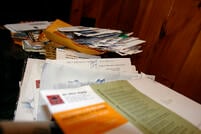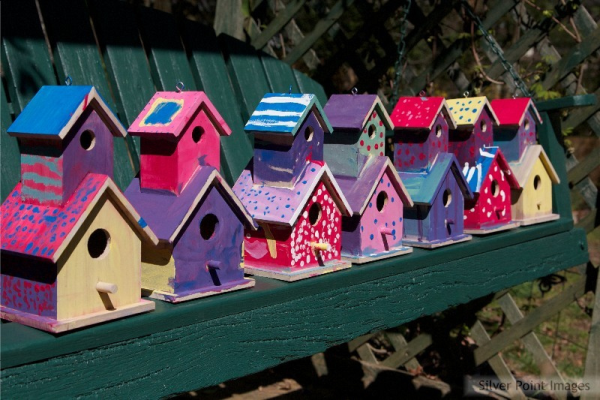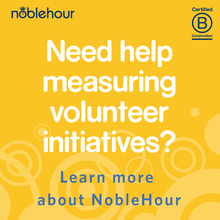Empowering NobleLeaders through Service Learning and Community Engagement
Hello NobleHour community! We're happy to announce that Dr. Kristin Joos, UF faculty-member, and recent college graduate and service-oriented young professional, Liz Harlan, have teamed up to write for our new “Empowering NobleLeaders” blog series. They both found their passions through service learning and community engagement and are eager to educate, inspire, and empower others to do the same. This first post introduces Kristin and Liz, as well as the topics they'll be covering in upcoming blog posts. We're excited to have them on board. Welcome, Kristin and Liz!
A bit about Kristin:
I am the Coordinator of the Innovative Sustainability & Social Impact Initiative in the Center for Entrepreneurship & Innovation in the Warrington College of Business at the University of Florida. I also direct the Young Entrepreneurs for Leadership & Sustainability High School Summer Program at UF, the only summer program in existence where college-bound high school students learn and practice the skills of successful business and community leaders, while being inspired to solve social, environmental, and economic problems.
As a high school student I participated in a youth organization where I learned the importance of community engagement; I was inspired by the director, a social entrepreneur, who challenged youth to risk their dreams and make a positive impact on society. We were exposed to a plethora of social problems and were encouraged to be part of the solutions. When I was 16 years old I was asked to speak in front of an audience of 2000+ people. I opened my speech with “So many times there is no peace outside our windows: extinction, pollution, unemployment, homelessness, racism, discrimination, disease, neglect, abuse... in our society the list goes on and on...” After early-admitting to college later that year, I decided not only did I want to learn how to solve social problems, I could have a bigger impact on the world if I educated others to do so as well.
I first learned of Social Entrepreneurship in 2000 when attending a conference for an international NGO, and met an Ashoka Fellow. At the time, I was completing my dissertation and studying high achieving teenagers who aspired to make a difference in their communities and the world. From then on, I was committed to dedicating my professional career to educating, inspiring, and empowering students to become changemakers. In 2005, I brought Social Entrepreneurship to UF. My current research and applied interests center around social entrepreneurship, sustainability, corporate social responsibility, service learning and community service, civic engagement, and creating positive social change. I am passionate about teaching and empowering students to use the skills and strategies of business to create innovative and sustainable solutions to social, environmental, and economic problems locally and around the world.
In 2006, I had the pleasure of being named Service Learning Professor of the Year at UF, because of the community service completed by my students. In fact, each year my students complete more than 1⁄4 of the UF President’s Goal of 1 Million minutes of service for all UF students. I am the author of Don't Just Count Your Hours, Make Your Hours Count: The Essential Guide to Volunteering & Community Service, a valuable resource for both service learning students and faculty and greatly appreciate the help of folks at the Corporation for National & Community Service, Campus Compact, and the National Youth Leadership Council.
I believe that education is a life-long process. In 2012 I participated in the International Social Entrepreneurship Programme at INSEAD. In 2013 I graduated from the AACSB PostDoc Bridge Program and was awarded Academic Scholar status. This spring, I will complete a Certificate in Social Entrepreneurship, sponsored by USASBE and the Kauffman Foundation and will also attend the Executive Program in Social Entrepreneurship at Stanford’s Graduate School of Business.
I delight in living in a historic home built in 1912. I find happiness in checking items off my never-ending to-do lists, practicing yoga, reading The Sun Magazine, supporting local farmers, learning to standup paddle board, and collecting quotable cards.
A bit about Liz:
I had the pleasure of working with Dr. Joos in high school with her Windows of Opportunity college and career advising program. In May of 2012, I graduated from Emory University with a B.S. in Anthropology and Human Biology and a minor in Global Health, Culture, & Society, and could not be more grateful to Dr. Joos for helping me in my acceptance to the perfect college fit.
My introduction to service began as a young child with two parents in the military. When I was not playing sports as a teenager, I loved to volunteer at my local library, homeless shelter, or middle school science summer camp. These volunteer experiences soon turned into ongoing community service activities. My mother believed spring breaks at the beach were too luxurious for high schoolers, so I traveled to Nicaragua on a medical service trip with a local church. I fell in love with medicine, other cultures, and decided I wanted to be a doctor. This led me to study Pre-Med and choose my major and minor at Emory, with professors who emphasized community engagement, taught courses in Community Based Service Learning, and urged us to reflect on everything from all perspectives. I was very involved in community service in Atlanta, as well as in Honduras and South Africa.
I value community service for the connections and relationships they create between people. All of my volunteer, internship, and community experiences recently helped grant me acceptance at the University of Florida College of Medicine. I am passionate about my future career of service. I balance work, family, traveling and staying active with helping at the Catholic Worker House in downtown Gainesville, Florida. As an independent and frugal adult, I am pursuing sustainable, local, and free ways to be fully immersed and involved in my community… and loving it!
A bit about the Empowering NobleLeaders Blog Series
We are thrilled to be working with NobleHour to help service learning faculty and community service coordinators find ways to get their students excited about volunteering, the benefits of long-term involvement in community service, and the personal transformation that often occurs. We will explore various topics, learning strategies, and community service programs on this blog, including social entrepreneurship, community service in higher education, how service helps both in college and a career, and leveraging community partnerships. Be on the lookout for our next blog coming soon highlighting how to leverage enthusiasm from MLK-Day service activities (or other Service Plunges) to maintain and sustain long-term involvement.
We're excited to launch this blog series and hope it helps you achieve your goals of engaging students with the community. Please let us know your favorite topics in the comments!



 Recycle
Recycle




